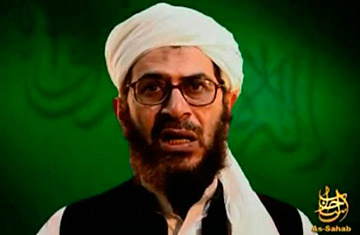
Al Qaeda leader in Afghanistan Mustafa abu al-Yazid, also known as Sheikh Sa'id al-Masri. intelligence agencies believe al-Masri, al Qaeda's No. 3 leader, was killed recently in a missile strike in the tribal areas of Pakistan, officials said on May 31, 2010.
Another senior al-Qaeda operative has been killed by a drone strike in Pakistan. He's an Egyptian named Mustafa al-Yazid, variously described as overall commander for Afghanistan and Pakistan, al-Qaeda's financier, and one of the movement's founding members. Obama Administration sources claim he was No. 3 in al-Qaeda, but since al-Qaeda does not have a chain of command in any sense that we recognize, that doesn't mean much. The real question is whether we're any safer with Yazid gone.
When news about Yazid broke, I happened to be on the phone with an FBI agent working counter-terrorism. His initial reaction to Yazid death was, "Does it really matter?" With al-Qaeda's leaders holed up in Pakistan's remote tribal region, cut off from the rank and file, and decimated by drone attacks, they're not in a position to organize or execute anything. They're lucky to stay alive. But he was quick to add that that does not mean we're out from terrorist threats.
My FBI friend had spent the weekend in the office, Memorial Day, time he had hoped to spend with his family. He said he was doing what he'd been doing for the last couple of years: tracking down homegrown terrorists — people living in this country drawn to jihad by Internet blogs, the self-recruited. None has any direct connections to al-Qaeda.
It's people like the failed Times Square car bomber, Faisal Shahzad, who worry the FBI far more than al-Qaeda's leadership does. Shahzad may have made connections with the Taliban in Pakistan, but that was well after he took his decision to act. Even then, there's a question over whether any al-Qaeda connection was ever made. Did Yazid even know of Shahzad's existence before he drove that car bomb to Times Square? There's no evidence for it. And Shahzad could have carried out his attack on his own, without the direction or help from al-Qaeda.
So, if the threat is so dispersed and amorphous, why hasn't there been a successful attack? I put that question to my FBI friend. "Internet volunteers are inept at building bombs," he said. "They don't understand the chemistry, and more likely to blow themselves up than they are [to blow up] someone else."
That certainly applies to Shahzad. He supposedly got bomb training in Pakistan, but the car bomb he parked near Times Square belies it. He either didn't understand how to apply the training, or the training was bad. His ammonium nitrate, fuel oil propane canisters concoction never stood a chance of detonating.
To put Shahzad's ineptness in context, it helps to remember the 1993 bombing of the World Trade Center. The bomb maker in that attack, Ramzi Yusuf, was a professional. He didn't learn his skills from the Internet or some friend in Pakistan, but rather in places such as Beirut and Afghanistan — in wars, by doing it rather than reading about it.
But today, Ramzi Yusuf or anyone else with his time served in war zones would stand little chance of being allowed into the United States. His visa application would have stood out, and he would be turned down, if for no other reason than his seemingly shiftless travels. The system is not perfect, as we know from the Nigerian who tried to bring a plane on Christmas Day last year, but it's a lot better than before 9/11. By controlling our borders we are safer.
After 9/11, we all expected a quick victory — something like the rapid capture of Osama bin Laden or even, for some, a miraculous transformation of the Middle East — but instead what we ended up in is a war of attrition. Yes, the killing of Yazid will help, as will keeping out bomb makers like Ramzi Yusuf. So will the FBI's running down each and every lead. And one day we will find out what happened to bin Laden, maybe even catch him. But it's the little victories that are going to allow us to prevail.
Baer, a former Middle East CIA field officer, is TIME.com's intelligence columnist and the author of See No Evil and, most recently, The Devil We Know: Dealing with the New Iranian Superpower.
